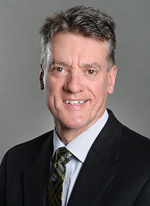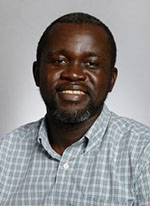April 04, 2024
Nearly 350 Transportation officials from across the globe discussed smarter ways to build and maintain roads during the third annual Data Science for Pavements Symposium (DSPS24) last month.

The international symposium focuses on advancing data science technology in the pavement field. It is a joint effort between the Federal Highway Administration, the University of Missouri’s Missouri Center for Transportation Innovation (MCTI) and the University of New Hampshire. This year, DSPS was held both virtually and at Turner-Fairbank Research Center in McLean Virginia.
Mizzou Engineering’s Bill Buttlar, Glen Barton Chair in Flexible Pavement, and Yaw Adu-Gyamfi, associate professor of civil and environmental engineering, served on the organizing committee.
“Attendees included a mix of data science experts, as well as professionals from transportation agencies, industry and academia, so it was a great opportunity for robust discussions and ideas,” Buttlar said.
Buttlar presented work on automated pavement and asset detection during the Better Information Management Spotlight. Specifically, he discussed the convergence of building information modeling, a process used to plan, design, construct and manage infrastructure.

Adu-Gyamfi presented the team’s research using an artificial intelligence (AI) suite for rapid, crowd-sourced, video-sensor-based curb, gutter and sidewalk evaluation.
“One of the highlights of DSPS24 was an agency roundtable forum where Jonathan Varner from the Missouri Department of Transportation shared insights about how artificial intelligence can help state highway agencies monitor and manage their transportation assets,” Buttlar said. “A working group formed from that discussion, and members now plan to further their own interests in data science for pavements. That’s really one goal of the symposium, to provide opportunities for these types of organic collaborations.”
Another popular portion of the symposium is the Student Data Competition, led by Adu-Gyamfi. The competition allows students to use AI to build models that monitor pavement conditions. This year, 32 teams competed with the top teams being invited to present at the symposium.
“This was the largest pool of participants since the competition began three years ago,” Adu-Gyamfi said. “It was great to see so many ideas as students explored how technology can revolutionize transportation.”